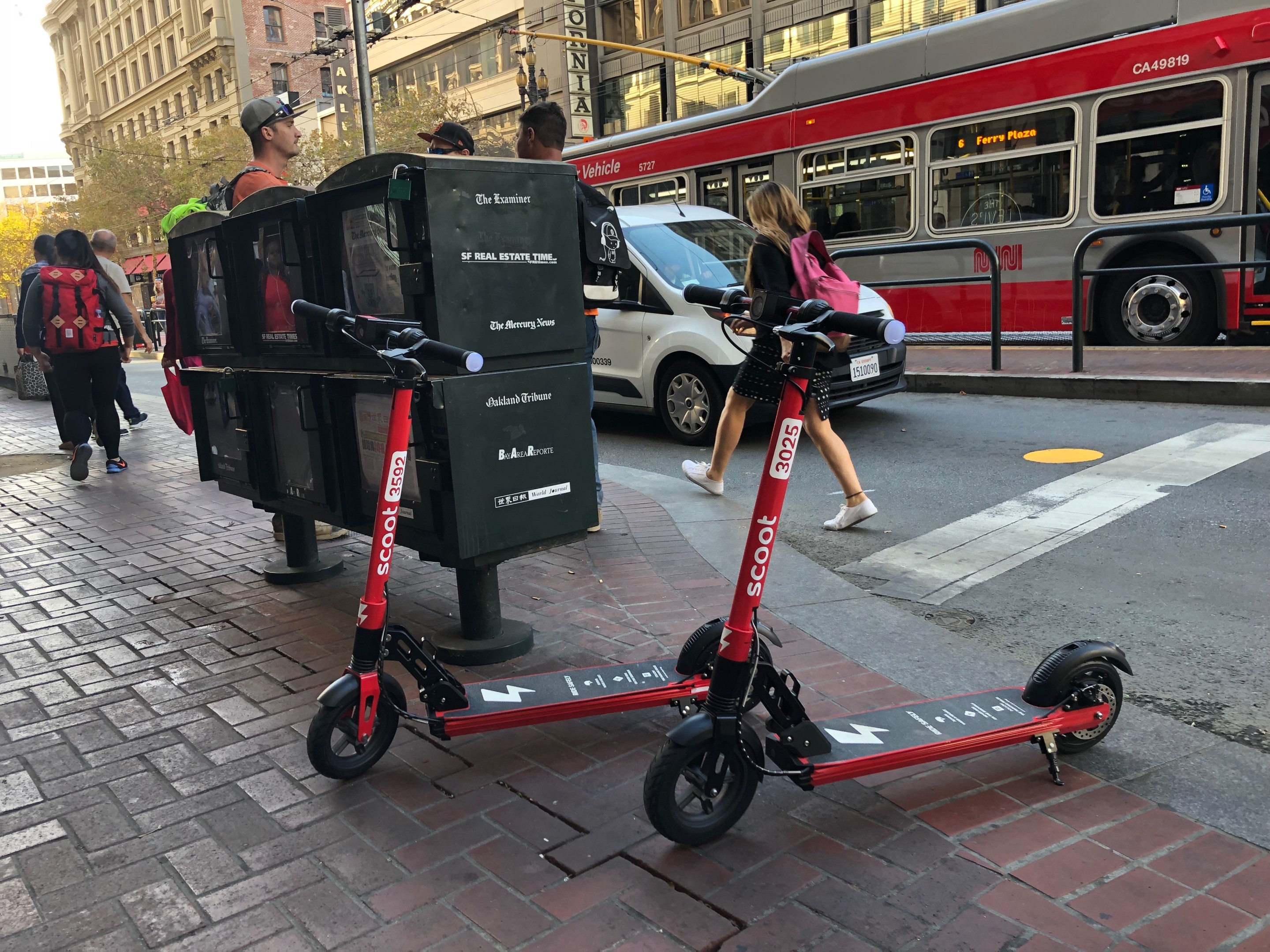Note: GJEL Accident Attorneys regularly sponsors coverage on Streetsblog San Francisco and Streetsblog California. Unless noted in the story, GJEL Accident Attorneys is not consulted for the content or editorial direction of the sponsored content.
Bird Scooters announced yesterday that it is launching a workaround program for SFMTA's permit process, which effectively banned them from doing business in the city. Instead of depositing scooters for per-trip use, it is now offering them for rent, in the more conventional sense of the word, at $24.99 per month.
From Bird's release:
People can open the Bird app and enter information such as where and when they would like their Bird delivered (home, work, elsewhere). After your order is placed, a Bird representative will follow up to confirm details and arrange for a personal Bird, charger, and lock to be delivered. When your rental period expires, Bird will come and pick up the vehicle, charger, and lock from your location.
The announcement comes after SFMTA's release of its findings for its scooter pilot study.
Streetsblog readers no doubt read the headlines last week (since overshadowed by Ed Reiskin's departure and Friday's Muni meltdown) such as, "Who’s riding those scooters around San Francisco? We’ll give you a hint, bro" in the San Francisco Chronicle or "Can Scooter Companies Meet Their Diversity Quota?" in SF Weekly.
These results were somewhat perplexing for those following the scooter phenomenon. After all, scooter use has been shown in many places to increase options for a wide range of people - more than bike-share and more than other micromobility projects. Anecdotally, across the Bay, scooters appear to be popular with more than just "bros."
So maybe there's something particular about San Francisco that is causing the problem.
"Demand for powered shared scooters is strong, and scooters may reduce private auto use and VMT [vehicle miles traveled]," concludes the study. It also has the point that the Chron, Weekly and others hammered: "More robust equity engagement is needed."
That was based on data from the study showing that 61 percent of survey respondents were White. "This compares with the demographics of San Francisco as a whole--41 percent White, 34 percent Asian or Pacific Islander, 15 percent Hispanic/Latino, 5 percent Black or African American, and 4 percent other and/or mixed" according to the study.
As we covered previously, San Francisco's reaction to the initial onslaught of scooters on the streets was to ban them--and then set up a pilot program which launched on Oct. 15, 2018. Scoot and Skip were the only companies allowed to operate in San Francisco, limited to 625 scooters for each company. Thus Bird's current workaround tactic.
At the time, Streetsblog chatted with scooter company employees and advocates for shared mobility options, and they expressed concern that the limited fleet sizes might prevent them from saturating some neighborhoods with enough machines for the systems to be useful. Instead, they would have to focus on downtown. The SFMTA permit program has stipulations about placing a percentage of the fleets in "communities of concern," but if you're attempting to distribute 20 percent of your scooters in a relatively large and lower-density "community of concern," and there's a scooter cap--how is that supposed to work exactly?
Oakland took a different perspective--they decided to equally enforce (albeit often that really means equally not enforce) current regulations as they apply to scooters, such as no riding of a motorized vehicle on the sidewalk, or blocking the public right of way, etc. Meanwhile, they are studying how they're getting used and by which groups, working with the companies to help crunch the data, meet equity concerns, and address complaints. The plan is to then, and only then, figure out a regulatory framework and permit program to address concerns about equity and other issues.
How are things going so far?
Well, so far they "...don’t have comparable data," to San Francisco, wrote Sean Maher, a spokeperson for Oakland's Department of Transportation. But he added that "Our anecdotal observations point to a diverse and racially representative group of Oaklanders using scooters."
(Again, that's probably consistent with the observations of anybody who lives or spends any time in Oakland, but please let us know what you think in the comments section).
"I don’t even know what you are talking about here in Oakland when you say 'tech bros' on scooters," added Bike East Bay's Dave Campbell, in an email to Streetsblog.
Meanwhile, a study from Populus, which makes its living by crunching data about scooters, bike-share/micro-mobility seems to confirm the anecdotes, at least broadly. Nationally, it found that "electric scooters attract a more diverse group of users," when compared to standard, docked-bikes that are part of an official bike-share system. Our sister publication Streetsblog USA looked at the issue in Washington D.C., where, actually, a disproportionate number of scooter users are Black. Citylab also ran a piece asking if dockless micro-mobility could pump up diversity in cycling.
In other words, it seems likely that SFMTA's own caps are the reason for, or at least contributed to, the disparity in San Francisco. It will be interesting to see what the Oakland study comes up with and then compare the two.
Oh, and on those VMT reductions, the San Francisco study concluded that "42 percent of all scooter user survey respondents indicated that they would have taken an automobile mode on their last trip had a scooter not been available... The vast majority of those users would have taken ride-hailing Uber or Lyft (36 out of 42 percentage points)."
In other words, it seems reasonable to conclude that if scooters are reducing car trips, then the SFMTA scooter caps result in more CO2.
Furthermore, "SF is missing out on all the fun," wrote Campbell. "Dumb policies sometimes lead to that."





